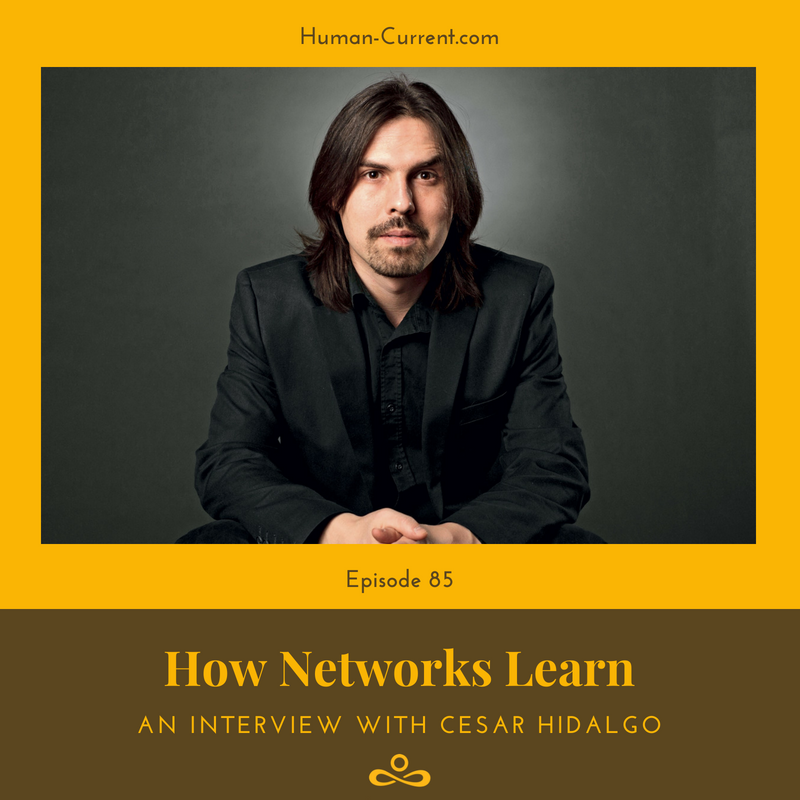Search Results for: entropy
Entropy Is Universal Rule of Language | Wired Science
The amount of information carried in the arrangement of words is the same across all languages, even languages that aren't related to each other. This consistency could hint at a single common ancestral language, or universal features of how human brains process speech. "It doesn't matter what language or style you take," said systems biologist…
Reply to The Man Who Tried to Redeem the World with Logic | Nautilus
👓 The Man Who Tried to Redeem the World with Logic | Issue 21: Information – Nautilus
Walter Pitts was used to being bullied. He’d been born into a tough family in Prohibition-era Detroit, where his father, a boiler-maker,…
🎧 Episode 085 How Networks Learn An Interview with Cesar Hidalgo | Human Current
In this episode, Haley talks with physicist, complexity scientist, and MIT professor, Cesar Hidalgo. Hidalgo discusses his interest in the physics of networks and complex system science and shares why he believes these fields are so important. He talks about his book, Why Information Grows: The Evolution of Order, from Atoms to Economies, which takes a scientific look at global economic complexity. Hidalgo also shares how economic development is linked to making networks more knowledgeable.
Quotes from this episode:
“Thinking about complexity is important because people have a tendency to jump into micro explanations for macro phenomenon.” — Cesar Hidalgo
“I think complex systems give you not only some practical tools to think about the world, but also some sort of humbleness because you have to understand that your knowledge and understanding of how the systems work is always very limited and that humbleness gives you a different attitude and perspective and gives you some peace.” — Cesar Hidalgo
“The way that we think about entropy in physics and information theory come from different traditions and sometimes that causes a little bit of confusion, but at the end of the day it’s the number of different ways in which you can arrange something.” — Cesar Hidalgo
“To learn more complex activities you need more social reinforcement.” — Cesar Hidalgo
“When we lead groups we have to be clear about the goals and the main goal to keep in mind is that of learning.” — Cesar Hidalgo
“Everybody fails, but not everyone learns from their failures.” — Cesar Hidalgo
“Learning is not just something that is interesting to study, it is actually a goal.” — Cesar Hidalgo
👓 Tenured Faculty Position at Princeton University | IEEE Information Theory Society
The Department of Electrical Engineering at Princeton University seeks outstanding applicants for a tenured appointment at the Associate or Full Professor level, effective as early as September 1, 2019. The search is open to candidates specializing in areas related to information sciences and systems, with strength in core fundamentals and an interest in applications areas such as networks, machine learning, energy systems, cyber-physical systems, robotics and control, wireless communications, biology, etc. The successful candidate should have a Ph.D. in Electrical Engineering or a related field, demonstrated excellence in academic research, and a proven track record of teaching and advising undergraduate and graduate students (if currently holding an academic appointment). We seek faculty members who will create a climate that embraces excellence and diversity, with a strong commitment to teaching and mentoring that will enhance the work of the department and attract and retain a diverse student body. Candidates must complete an online faculty application at: https://www.princeton.edu/acad-positions/position/4801; a detailed curriculum vitae, descriptions of teaching and research interests, reprints of selected publications, and the names and addresses of three references should be uploaded as .pdf documents via the on-line application. This position is subject to Princeton University's background check policy. To ensure full consideration, applications should be received by November 15, 2018, but the search will remain open until the position is filled.
📺 A Universal Theory of Life: Math, Art & Information by Sara Walker
Dr. Walker introduces the concept of information, then proposes that information may be a necessity for biological complexity in this thought-provoking talk on the origins of life. Sara is a theoretical physicist and astrobiologist, researching the origins and nature of life. She is particularly interested in addressing the question of whether or not “other laws of physics” might govern life, as first posed by Erwin Schrodinger in his famous book What is life?. She is currently an Assistant Professor in the School of Earth and Space Exploration and Beyond Center for Fundamental Concepts in Science at Arizona State University. She is also Fellow of the ASU -Santa Fe Institute Center for Biosocial Complex Systems, Founder of the astrobiology-themed social website SAGANet.org, and is a member of the Board of Directors of Blue Marble Space. She is active in public engagement in science, with recent appearances on “Through the Wormhole” and NPR’s Science Friday.
🔖 Irreversibility and Heat Generation in the Computing Process by R. Landauer
It is argued that computing machines inevitably involve devices which perform logical functions that do not have a single-valued inverse. This logical irreversibility is associated with physical irreversibility and requires a minimal heat generation, per machine cycle, typically of the order of kT for each irreversible function. This dissipation serves the purpose of standardizing signals and making them independent of their exact logical history. Two simple, but representative, models of bistable devices are subjected to a more detailed analysis of switching kinetics to yield the relationship between speed and energy dissipation, and to estimate the effects of errors induced by thermal fluctuations.
Book Review: Son of Fletch by Gregory Mcdonald
🔖 H-theorem in quantum physics by G. B. Lesovik, et al.
🔖 Advanced Data Analysis from an Elementary Point of View by Cosma Rohilla Shalizi
Hector Zenil
Weekly Recap: Interesting Articles 7/24-7/31 2016
A New Thermodynamics Theory of the Origin of Life | Quanta Magazine
Jeremy England, a 31-year-old physicist at MIT, thinks he has found the underlying physics driving the origin and evolution of life.




